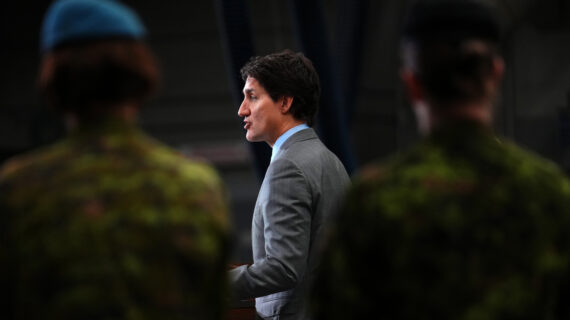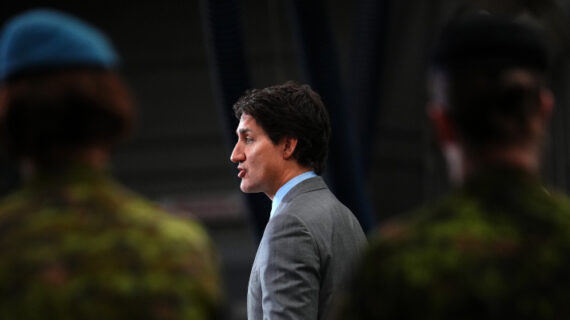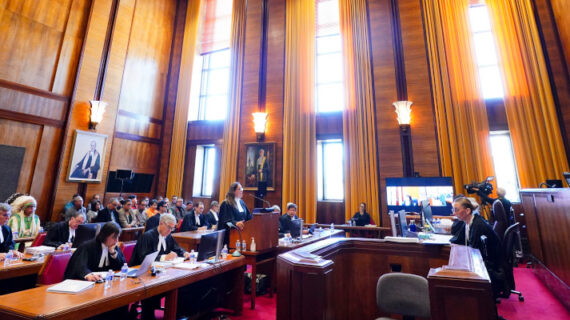- If passed, Premier Smith's legislation would make Alberta the third province to implement a policy around parental rights, with her plan being the most far-reaching.
- Commentators are deciding whether the plan strikes a fair balance between respecting the rights of parents and those of trans youth.
- Charter challenges are likely inevitable and we could see the return of a provincial government invoking the notwithstanding clause.
Alberta Premier Danielle Smith’s announcement that her government would introduce gender and sexuality legislation has set off waves of praise and ignited prairie fires of condemnation. If passed, the legislation would make Alberta the third province to implement a policy around parental rights, with Smith’s plan being the most far-reaching.
Similar to legislation already enacted in Saskatchewan and New Brunswick, Alberta’s proposed plan would cover pronoun and name changes. But Smith’s plan would go even further, addressing gender-affirming surgeries, hormone therapy, as well as the participation of trans athletes in sports.
In the video announcement, Smith made efforts to communicate that she was not questioning the legitimacy of a trans person’s gender identity and that the province would support them.
“In the case of persons aged 17 and under who identify as transgender, I always want you to know that you are loved and supported as you work your way through your often changing emotions, feelings, and beliefs,” said Smith. She added that the Alberta government is seeking to attract transgender surgery specialists to ensure that the health-care needs of the transgender community are met.
One perspective not often heard is the reaction from trans members of Premier Smith’s own party. Blaine Badiuk is a United Conservative Party (UCP) member, a former student teacher, and a trans woman. She said she has mixed feelings about the announcement and is unsure if it struck the right balance.

“Part of this is playing politics, like the ban on surgeries. It is already in practice, but [it’s] an easy win for the base,” says Badiuk. “I do genuinely believe Smith wants to get this right. I am hopeful that some concerns can be addressed through the implementation piece. Broad policies are one thing, but the actual details are another.”
The proposal bans gender-affirming surgery for Alberta children aged 15 and younger, as well as top and bottom surgery for kids under 17. However, the policy appears to be redundant, as according to Alberta law, you must already be 18 to have top or bottom surgery.
The proposed legislation: a breakdown
Outside of surgery, Alberta’s legislation would require parental consent for a child, under the age of 16, to change their pronoun or name at an Albertan school. If the child is over 16, the parents must only be notified.
Hormone therapy and puberty blockers would be prohibited for children aged 15 and under unless they have already begun the process. Youths aged 16 and 17 would be permitted to undergo hormone therapy with approval from their parents, physicians, and psychologists if deemed mature enough.
When it comes to schooling, parents would need to be notified and provide consent for their child to receive in-classroom instruction on sexual orientation, gender identity, and human sexuality. Prior approval from Alberta’s education ministry would be required for the use of third-party materials for these subjects from kindergarten through grade 12.
The provincial government would also take steps to ensure transgender female athletes do not compete against cisgender women and girls. Transgender athletes would be allowed to participate in expanded co-ed or gender-neutral leagues.
Does the legislation go too far?
Some liked what they saw. Michael Zwaagstra, a public high school teacher and a senior fellow at the Frontier Centre for Public Policy, believes Smith’s announcement was very reasonable.
“I think that the requirement that students must be at least 16 before they can change their names or pronouns without parental consent recognizes that 16 is an age where mature minors have considerable autonomy,” says Zwaagstra. “What I see from these guidelines is a recognition that mature minors have considerable autonomy, but this autonomy is not absolute.”
Zwaagstra says he believes Smith did make a genuine effort to create a balanced policy, but the polarizing nature of the issue remains a challenge.
Badiuk says the proposed new laws regarding the participation of trans women in sports leagues, especially in co-ed and gender-neutral leagues, seem reasonable. But she believes refusing hormone replacement therapy (HRT) to kids under 16 is an overreach.
“Why are we saying that if a doctor, psychologist, parent, and teenager all consent to having HRT at age 12 or 14, the government should be stepping in and making a medical decision for you?” asks Badiuk. “It goes entirely against any idea of ‘parental rights’ or medical autonomy.”
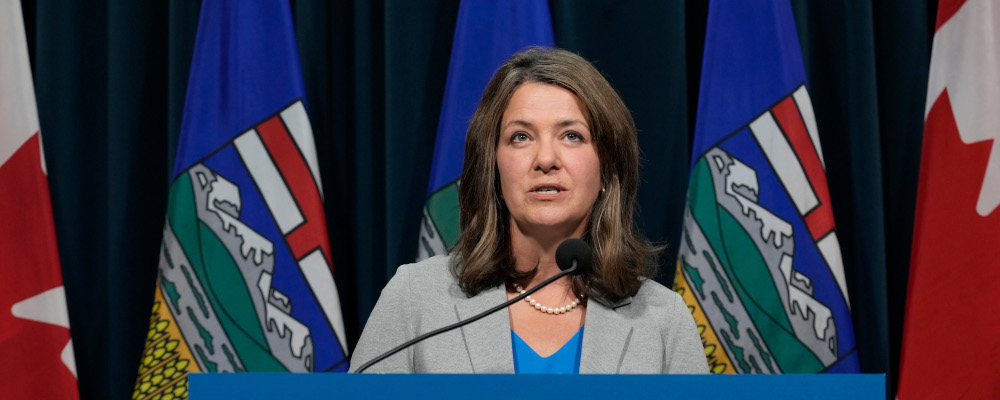
Others, including on the other side of the political spectrum, concur. Kristopher Wells is an associate professor in the Department of Child and Youth Care at MacEwan University in Edmonton. The Canada Research Chair for the Public Understanding of Sexual and Gender Minority Youth agrees the legislation goes against the UCP’s principles of smaller government and enhanced individual freedom.
“These kinds of policies certainly limit freedom and restrict access to important medical care,” insists Wells. “So it is a bit ironic for a party that claims to be about expanding the space of freedom to be restricting it against a very vulnerable group of young people.”
Different provinces, different rights
Many have noted that the proposed legislation goes further than the parental rights policies enacted by other provincial governments; with Saskatchewan being the next most extensive, followed by New Brunswick.
Zwaagstra, for example, points out a key difference between Smith’s proposal and the legislation brought in by New Brunswick in 2023.
“The main difference is that while parental consent for name and pronoun changes is not required in Alberta for students above the age of 16 [and 17], parents must still be notified,” he says. “In contrast, New Brunswick does not have a notification requirement for students above the age of 16.”
For Badiuk, there are still blanks to be filled in Alberta. If students aren’t sure how to talk to their parents about these issues, she would like to see the legislation offer a pathway to support. Furthermore, in cases where such a discussion might become unsafe for a child, she calls for resources to be provided so that alternatives can be explored.
“The challenge is that this issue has become very polarized.”
In fact, this is the route that New Brunswick has taken. Following consultations, the government clarified that “If it is not in the best interest of the child or could cause harm to the student (physical or mental threat), the student will be directed to the appropriate school professional for support.”
Wells looks east to neighbouring Saskatchewan and points to the differences between that province’s policies and Alberta’s. In Saskatchewan, a student wanting to change their name, gender identity, or gender expression only needs parental or guardian consent if the child is under 16. If they are 16 or older, they do not need permission.
“The policies that Danielle Smith has introduced are much more draconian and far-reaching and will have a significant and damaging impact on the lives of trans, gay, lesbian, and bisexual people in the province,” says Wells whose comments are reflective of a common line of criticism from the government’s most vociferous critics.
Debate likely to play out in courts and among the public
Wells adds that legal challenges to these types of legislation are almost certain.
“They violate the Alberta Human Rights Act and violate the Canadian Charter of Rights and Freedoms,” he says. “And as we’ve seen already, several groups have announced their intention to file legal challenges against the government, should these policies be enacted.”
Egale Canada, an LGBTQ advocacy organization, has already started plans to mount a legal challenge against Alberta’s parental rights legislation. Last year, the organization launched another legal challenge against the Saskatchewan government after it passed its own parental rights bill.
After the Saskatchewan government passed parental rights legislation in 2023, a court injunction temporarily halted the policy’s implementation pending a constitutional assessment. Premier Scott Moe then used the constitutional provision of the notwithstanding clause to cement the policy.
The notwithstanding clause, when invoked, allows governments to override certain constitutional rights for up to five years, thus permitting the policy’s enforcement despite potential constitutional concerns.
Zwaagstra believes Smith, like Moe, would be absolutely justified in employing the notwithstanding clause in the case of a Charter challenge to Alberta’s parental rights legislation.
“The notwithstanding clause is just as legitimate a part of the Charter as any other section,” says Zwaagstra. “When it comes to contentious social policy, it makes sense for elected legislators rather than appointed judges to have the final say.”
New Brunswick has not invoked the notwithstanding clause over their gender and sexuality legislation.
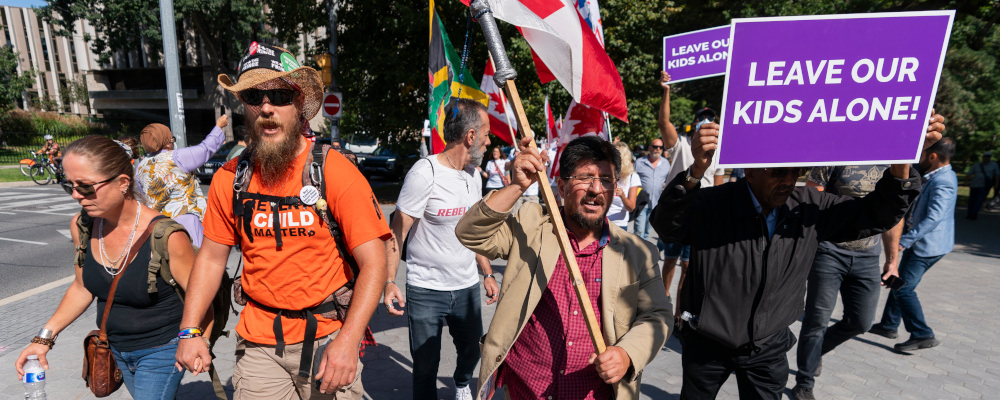
Zwaagstra adds that the parental rights policies are merely expressing the opinions of most Canadians. He believes the public outcry over the proposed legislation—such as the recent protests in Ottawa—is actually evidence of a divide between the federal and provincial governments.
“I think the backlash is more about an ideological divide between a federal Liberal government and a provincial Conservative government,” says Zwaagstra. “It’s also important to remember that opinion polls show that parental rights proposals are popular in all parts of Canada, not just the West.”
Surveys from last summer—after New Brunswick implemented its parental rights legislation— suggested a majority of Canadians support these gender and pronoun policies to varying degrees. Only 14 percent of those surveyed by Angus Reid said parents should neither be informed nor have a say in a child’s gender and pronoun changes.
In the face of these ongoing surveys, protests and constitutional challenges, Badiuk cautions that it is a mistake to turn parental rights into a black and white debate.
“That is where we need to step in. I think the debate misses the mark in that, on one side, you have them saying parents have absolute rights no matter what,” says Badiuk. “And the other side simply presumes every parent is bad. Neither is the reality. There is a nuance in this, and I think we need to restore humanity in this discussion and remember [that] these are kids’ lives we are talking about.”


